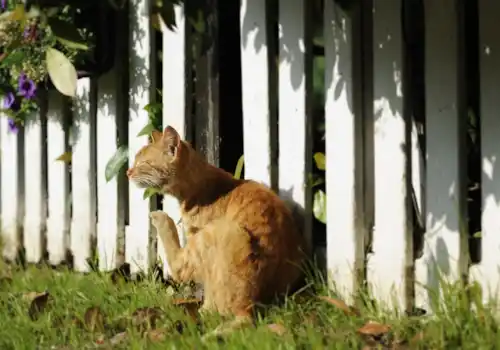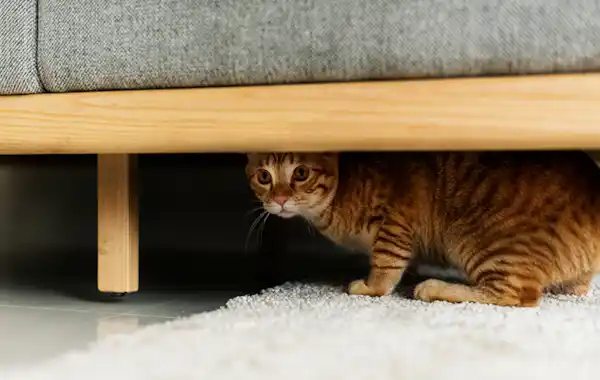While desensitising your cat to fireworks, there are many things owners can do to make fireworks less stressful for their cats.
Follow these top tips to help your cat cope:
Coping with the bangs
- Bring your cat in before dark — do this a few times before the event so your cat gets accustomed to being indoors at night. You can tempt them in with their favourite treat. Make sure all windows are closed and cat flaps locked.
- Provide hiding places — your cat may well be frightened and want to hide. Bear in mind where they usually like to hide away; if your cat likes to be perched up high, make sure there is a hiding spot in an elevated location (such as on top of a wardrobe). Similarly, if they like to hide under the bed, make sure they have the opportunity to do so.
- Keep calm and carry on — as tempting as it is, try not to cuddle your cat more than you usually would; any change in your usual behaviour could add to their anxiety as he believes there is something to worry about. Treat your cat as normal and only stroke him when they come to you seeking fuss. The calmer you are, the more likely your cat is to relax.
- Play music — playing music or watching TV can help mask the sudden sounds of fireworks.
- Distractions — use toys and treats (if he feels comfortable enough) to keep his attention on positive things.
- Close the curtains — doing this can help hide the flashes and reduce the bangs of the fireworks.
- Diffusers — plug in a pheromone-releasing diffuser in the room your cat spends most of their time in 48 hours before the event to help them feel more relaxed.
Content continues after advertisements
Other things to consider
- Microchipping — frightened cats can easily become confused and lost. Making sure your cat is microchipped and your details are up to date will increase your cat’s chances of being returned home safely should the worst happen and he bolts.
- Litter trays — have a few of these dotted about the house, especially if your cat is used to toileting outside.
- Stay home — if possible, stay home with your cat.
- Don’t shut your cat in a confined area — let them have freedom to roam the house. If confined, they may injure themselves trying to escape if they panic.
- Sparklers — if your family enjoy sparklers, never light them inside and always make sure they are extinguished and disposed of properly so no paws can be injured by standing on them the next day.
- Bonfires — these and cats are not a good mix. We know how curious cats are and they can injure themselves trying to explore them. Always check bonfires before lighting as they provide great places for both cats and wildlife to hide.
Signs your cat is scared
Cats are very good at hiding how they are feeling. However, here are some signs that indicate they are stressed:
- Dilated pupils.
- Hissing or grumbling.
- Withdrawing from you.
- Crouching.
- Ears pinned back.
- Arched back.
- Nose licking.
- Tail wrapped around the body, twitching or fluffed up.
- Tense muscles.
- Hiding more than normal or in unusual places.
- Urine spraying or toileting in inappropriate places.
- Loss or increased appetite.
- Scratching objects near doors or windows.
- Excessive grooming.
If you are particularly concerned about your cat and fireworks, speak with your vet who may refer you to a behaviourist who can help you reduce your cat’s stress. Similarly, if you notice your cat seems to be struggling after Bonfire Night has passed, seek professional advice.









